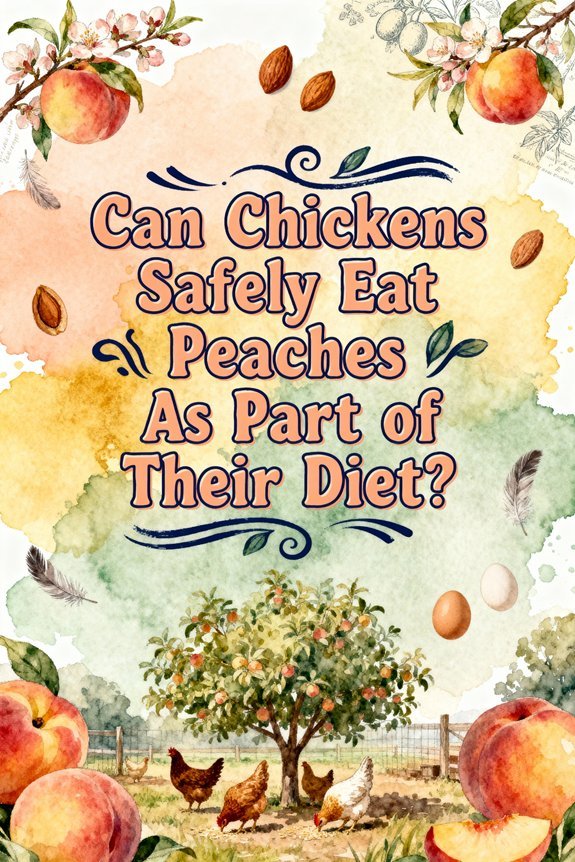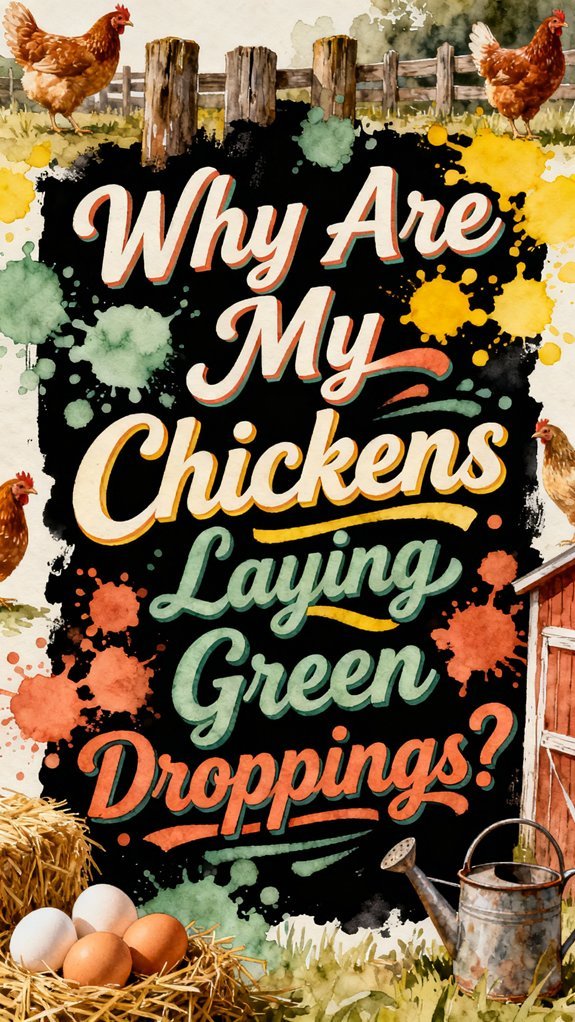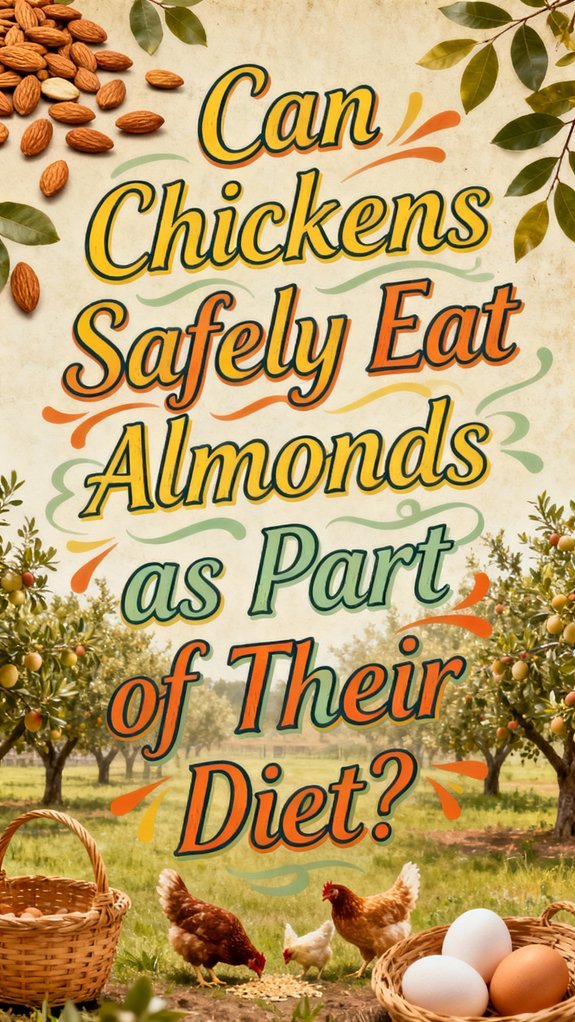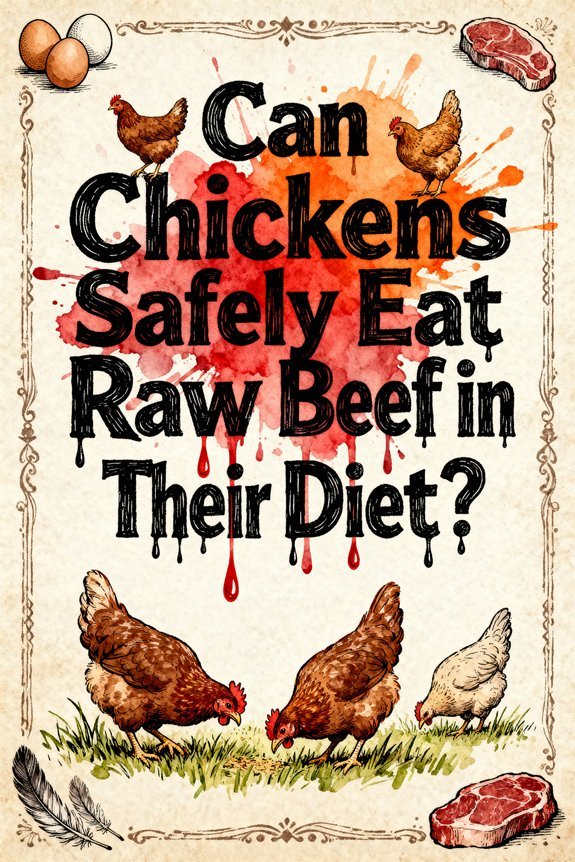Yes, you can safely feed peaches to your chickens when properly prepared. You’ll need to remove all pits and seeds first, as they contain toxic cyanide compounds. Cut the fruit into small, manageable pieces to prevent choking, and thoroughly wash to eliminate pesticide residues. Fresh peaches offer valuable nutrients like vitamins A, C, E, and minerals that support egg production and immune health. Understanding proper portions and preparation methods guarantees your flock benefits from this nutritious treat.
The Nutritional Value of Peaches for Chickens
While chickens maintain a diverse diet in nature, peaches offer them a rich array of vital nutrients that support their overall health and liveliness. You’ll find these fruits packed with essential vitamins, including vitamin A and beta carotene for vision and immunity, plus vitamin E and K for cellular protection. Most peach varieties also contain B-complex vitamins that boost metabolism and energy production.
The fruit’s mineral composition includes potassium for muscle function, along with magnesium and phosphorus that enhance nutrient absorption and bone development. Your chickens will benefit from the antioxidants that combat free radicals and strengthen their immune system. The high water content and dietary fiber promote digestive health, while natural sugars provide quick energy for daily activities. These nutritious fruits can support quality egg production by contributing to stronger eggshells and more nutrient-rich yolks.
Safety Considerations When Feeding Peaches
Although peaches provide excellent nutrition for chickens, proper safety measures are essential when incorporating these fruits into their diet. You’ll need to remove all pits and seeds, as they contain amygdalin which converts to toxic cyanide. Cut peaches into small pieces to prevent choking hazards, and wash them thoroughly to remove any skin residues from pesticides. Organic peaches are your safest option.
Never feed your chickens processed peach products containing sugar, salt, or other additives, as these can cause obesity and metabolic disorders. Similar to crop impaction issues seen with excessive hay consumption, overfeeding peaches can lead to digestive problems. Avoid giving them peach leaves, stems, or any non-fruit parts that contain harmful toxins. If you’re using store-bought peaches, consider peeling them to eliminate potential chemical exposure. Remember to introduce peaches gradually and monitor your flock for any adverse reactions. Ensure you provide multiple feeding bowls to prevent competition and aggression among chickens during feeding time. Consider feeding peaches within an electric fence perimeter to keep both your chickens and their food safe from predators.
How to Properly Prepare Peaches for Your Flock
Since proper preparation of peaches is essential for your flock’s safety, you’ll need to follow specific steps before feeding this nutritious fruit to your chickens. Begin with thorough washing techniques, using running water and a gentle brush if needed to remove dirt, bacteria, and pesticide residues. Always remove the pit completely, as it contains dangerous cyanogenic compounds that can release toxic cyanide. The fruit’s rich Vitamin A content helps maintain your chickens’ vision and immunity when offered as part of their diet.
Cut the cleaned peaches into small, manageable portion sizes that prevent choking hazards. You can leave the nutritious skin intact while creating bite-sized pieces that make the fruit accessible to all birds. For creative serving options, try hanging peach pieces on strings near the coop to promote natural foraging behavior. Remember to use fresh peaches and avoid canned varieties that might contain harmful additives.
Health Benefits of Adding Peaches to Chicken Diet
Adding peaches to your chickens’ diet provides a wealth of essential nutrients and health-promoting compounds that support their overall well-being. They’re rich in vitamins A, C, and E, along with minerals like magnesium, iron, and selenium that enhance metabolic functions. The fruit’s powerful antioxidants, including caffeic acid and polyphenols, help combat oxidative stress and strengthen your flock’s immune system. The natural prebiotic production benefits from peaches help maintain optimal digestive health in chickens. Like cucumbers, peaches are an excellent source of hydrating nutrients that can help keep your flock cool during hot weather.
Peaches particularly benefit your chickens’ digestive health through their soluble and insoluble fiber content, which promotes balanced gut microbiota and improved nutrient absorption. The fruit’s anti-inflammatory properties may reduce chronic inflammation risks while supporting liver function. Research suggests that peaches’ antibacterial properties and immune-boosting compounds could help decrease the need for antibiotics while enhancing vaccine effectiveness in your flock.
Warning Signs of Peach-Related Toxicity
While peach flesh provides nutritional benefits for chickens, exposure to peach pits and plant materials can trigger severe toxic reactions that require immediate attention. Similar to how toxic sulfur compounds in green onions can harm chickens, peach pits contain dangerous substances.
Watch for toxicity symptoms including lethargy, weakness, and excessive salivation. Cyanide effects from ingested pits or wilted leaves can cause respiratory distress, characterized by panting and labored breathing. You’ll notice dilated pupils and brick-red mucous membranes in affected birds. In severe cases, chickens may exhibit neurological signs like tremors and loss of motor control.
If you observe these warning signs after potential exposure to peach pits, stems, or leaves, seek immediate veterinary care. The presence of diarrhea, coupled with respiratory and neurological symptoms, strongly suggests peach-related toxicity. Remember that while the flesh is safe, ingestion of plant parts containing amygdalin can be life-threatening. Death can occur within 15 to 30 minutes after consuming toxic peach parts.
Best Practices for Serving Peaches to Chickens
To safely incorporate peaches into your chickens’ diet, proper preparation and serving methods are essential for preventing health risks. Before offering peaches, remove all pits to eliminate exposure to toxic compounds, and wash the fruit thoroughly to reduce pesticide residue. Check peach ripeness to guarantee peak nutrition and digestibility. Since peaches should only be given as treats, limit them to 10 percent treats of their total daily diet.
You’ll want to slice peaches into manageable pieces for your flock, or hang whole pitted fruits to encourage natural foraging behavior. Mix peach pieces with other safe fruits for dietary variety, and limit servings to once or twice weekly. Consider mounting peaches on branches or coop structures to promote activity while feeding. Similar to how fresh cranberries provide nutritional benefits, the natural aroma of peaches will entice your chickens to investigate and eat this healthy treat. If you’re using non-organic peaches, peeling the skin provides extra protection against pesticides, though you’ll sacrifice some nutritional benefits.
Enrichment Activities Using Peaches
Peaches offer numerous opportunities for engaging enrichment activities that support your chickens’ physical and mental well-being. You’ll find that interactive foraging with peach pieces encourages natural behaviors when you incorporate them into treat balls or scatter them in hay. For sensory stimulation, utilize peaches’ appealing scent and varied textures by creating DIY toys like frozen peach pop-ups or kebabs with alternating fruits. Like with hanging cabbage, peaches can be suspended to create engaging foraging opportunities.
You can enhance social bonding by offering peach treats to small groups and observing their interactions. Consider constructing puzzle feeders using peach halves or creating treat blocks that combine mashed peaches with oats. These enrichment activities don’t just entertain – they provide nutritional benefits through vitamins and antioxidants while promoting physical activity and mental stimulation throughout your flock’s environment.
Seasonal Guidelines for Peach Feeding
When planning your seasonal peach feeding schedule, you’ll need to align treats with summer’s peak harvest months while maintaining strict portion control. Introduce peaches gradually, offering just a few small slices per chicken to monitor for adverse reactions. Maintaining a 10 percent limit on peach treats helps prevent excessive sugar consumption and promotes balanced nutrition.
During peach seasonality, you’ll want to guarantee proper preparation by washing fruits thoroughly and removing pits to eliminate choking hazards. Keep the skin on for added nutritional benefits, but avoid feeding leaves or stems. Store fresh peaches in cool, dry conditions and use them promptly to prevent spoilage.
Monitor your flock closely during peach feeding periods for signs of digestive upset or uneven consumption. Remove uneaten pieces quickly to maintain coop hygiene, and consider using organic peaches to minimize chemical exposure. Always maintain their regular balanced diet, using peaches only as supplemental treats.
Alternative Fruits Compared to Peaches
While peaches offer excellent nutritional benefits, several alternative fruits can provide comparable or complementary nutrients for your chickens’ diet. Among berries alternatives, you’ll find blueberries rich in brain-boosting antioxidants, while strawberries and raspberries deliver immune-supporting vitamin C and fiber. In tropical fruit comparison, bananas provide potassium, and ripe mangoes offer vitamins A and C, though you’ll need to remove their peels first. Watermelon and other melons serve as hydrating treats during summer months. When feeding common temperate fruits, remember to remove seeds from apples and pears, as they contain harmful compounds. You’ll want to avoid avocados entirely due to persin toxicity, and use caution with citrus fruits as they may cause digestive issues. Lemons and other citrus fruits can provide immune system support but should be offered sparingly to prevent stomach upset. Creating a diverse fruit selection helps establish a natural foraging environment that chickens instinctively prefer. For additional variety, consider offering raw carrots which provide beneficial fiber for digestive health.
Monitoring Your Chickens’ Peach Consumption
How effectively you monitor your chickens’ peach consumption can make the difference between a healthy treat and potential health risks. Your peach serving strategies should focus on small portions of fresh, raw fruit with all pits and seeds removed to prevent cyanide poisoning. Don’t make peaches a daily treat; instead, offer them sporadically to maintain balanced nutrition.
Flock behavior monitoring is essential after introducing peaches. Watch for signs of digestive upset like diarrhea or lethargy, and guarantee adequate water intake as fiber consumption increases. Clean up fruit remnants promptly to prevent pest attraction and mold growth. You’ll need to evaluate overall health changes, including feather quality and egg production, to confirm that peaches are benefiting your flock without compromising their primary nutritional needs.






